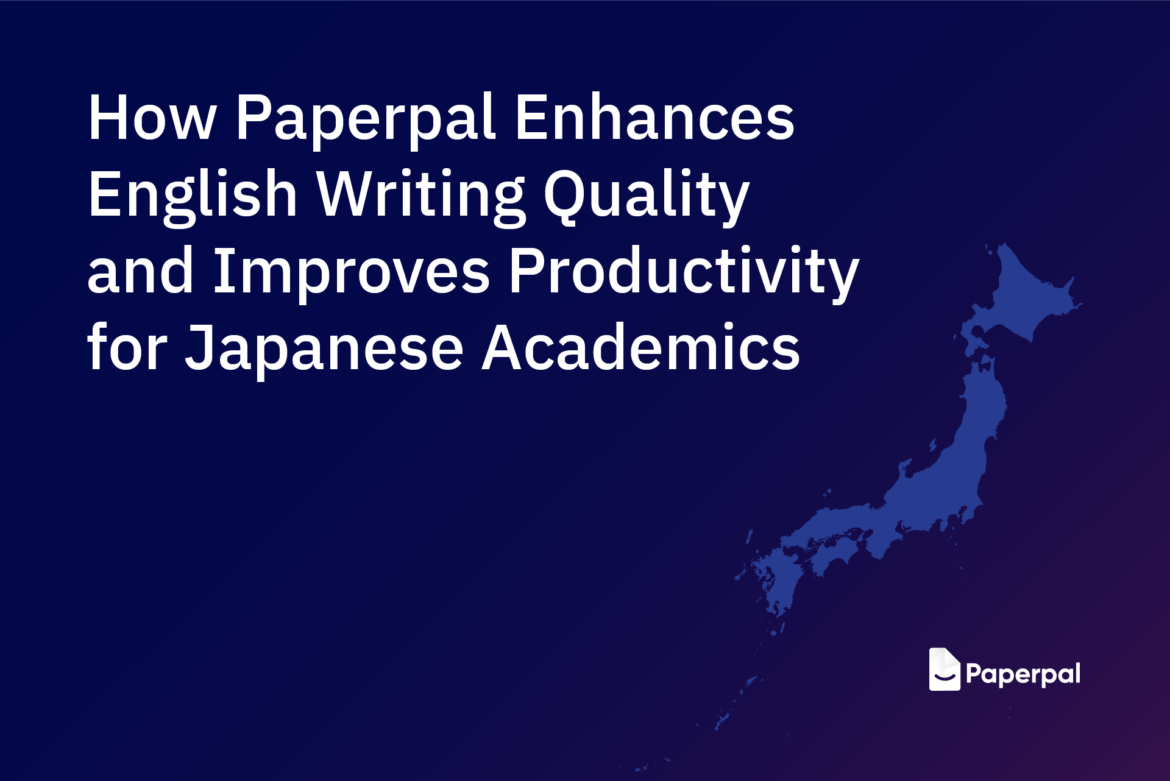Table of Contents
Publishing in English is considered critical to maximize your research impact. However, in Japan this is a major challenge with many Japanese researchers facing difficulties in using English, especially when it comes to finding the right words. [1] Here, Paperpal has emerged as a trusted partner for academics in Japan. In this case study, we will discuss how students and researchers from Japan’s top universities use Paperpal to produce high-quality English writing, reduce writing time by 60%, improve overall productivity, and achieve their goals faster.
Academic Writing Challenges for Japanese Students and Researchers
While academic writing has its own set of challenges especially for non-native English speakers, this is further exacerbated by the cultural trends in Japan.[2] This includes low priority for studying abroad, limited exposure to English content, and inadequate global research opportunities, leading to a low rate of international publications despite a strong domestic academic publishing landscape.[3] In 2023, Japan ranked 87 of 113 counties in the EF English Proficiency Index[4] and unlike global patterns, this proficiency is on the decline with younger researchers in Japan finding it more difficult to use English than their older colleagues.
These cultural and language barriers impact the English research and writing journey for Japanese academics. A PLOS survey, which says that researchers with moderate English proficiency spend as much as 51% more time to write in English and a staggering 91% more time to read English papers.[5] With the time and effort it takes to communicate in English, it’s not surprising that many Japanese academics are apprehensive about learning and using English, which can further impact quality and erode productivity.[6] In such a scenario, students and academics are increasingly turning to AI, with 54% using AI tools multiple times a week (some daily) to ease the academic writing process.[7]
Paperpal’s All-in-One Academic Writing Toolkit Comes to the Rescue
In an evolving AI landscape, there are hundreds of tools for researchers, each for a specific purpose. However, few are tailored to understand and enhance academic writing, and even fewer offer comprehensive assistance to help academics research, write, and cite accurately in half the time. Paperpal’s all-in-one solution is what makes it stand out as the perfect AI writing tool for Japanese academics.
What is Paperpal?
A trusted AI writing assistant by Editage, Paperpal blends 22+ years of academic publishing expertise with advanced AI to provide comprehensive writing, language editing, and submission readiness support. Its extensive feature suite provides human precision at machine speed, helping Japanese academics write confidently, achieve high-quality English writing, and accelerate the journey to being publication-ready.
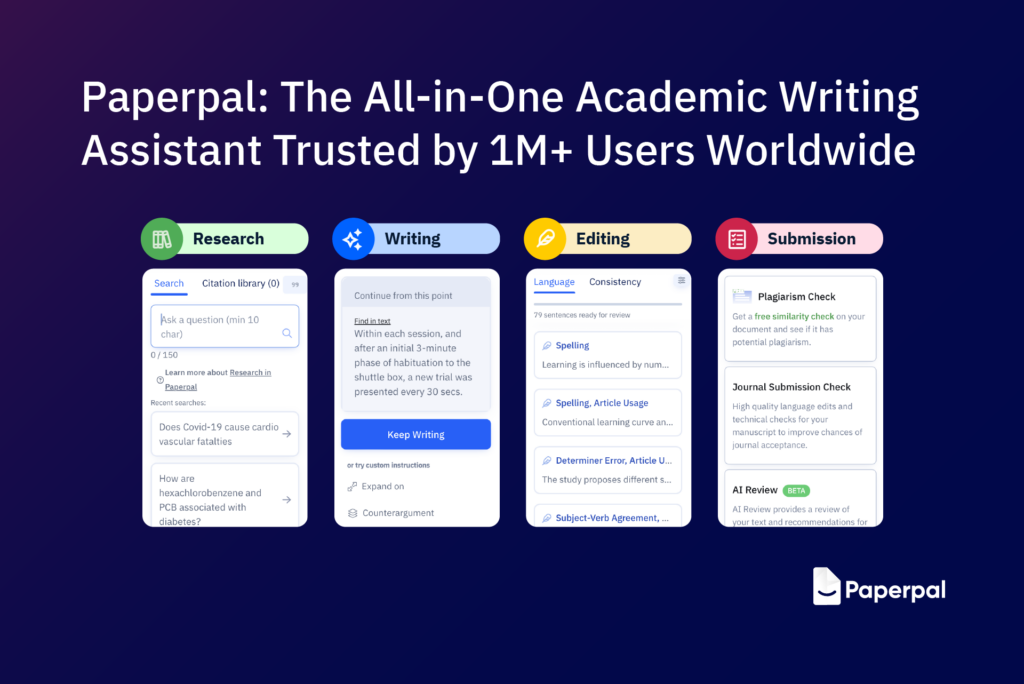
Paperpal in Japan: Who Uses This AI Writing Tool and How?
Japanese academics are regularly using Paperpal to break through the language barrier and write faster and better. By simplifying the writing process, students and researchers can do more of what they love – focus on science!
Among Paperpal users in Japan, the top three groups are students in High School or pursuing their Bachelor’s degree, Master’s and PhD students, and Post-Docs and Professors. In Japan, Paperpal is highly favoured by mid-to-senior academics (24% of total Paperpal users in Japan), comprising of postdoctoral researchers and professors, who use its features to streamline their academic writing.
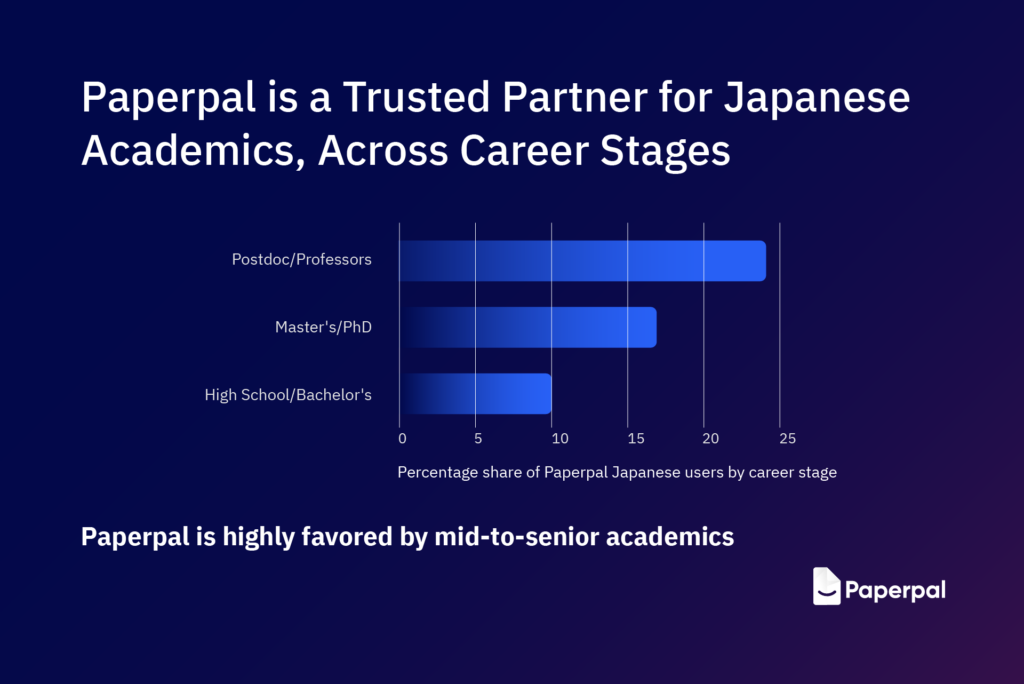
How Japanese Academics Use Paperpal to Write Better, Faster
Japanese academics are making the best use of Paperpal to quickly write, translate, and refine their academic text. A deep dive into how Japanese students and researchers are using Paperpal’s features reflected areas where they needed the most support.
Academics in Japan are maximizing Paperpal’s features for:
- Editing, polishing, and proofreading academic content (14M+ words checked for language)
- Accurate translation, without meaning changes (150K+ requests for English translation)
- Writing assistance to beat writer’s block and convey ideas better (123K+ text generations)
- Research support with factual insights that strengthen their writing (2K+ questions asked)
- Pre-submission checks to minimize risk of desk rejection (6,000+ checks completed)
Submission Readiness Checks to Minimize Risk Of Desk Rejection
As more Japanese academics aspire to publish in leading global journals, it becomes important to ensure their work is complete, polished and ready to submit. This trend is mirrored in the growing number of researchers in Japan who leverage Paperpal’s pre-submission check to reduce the risk of desk rejection. More than 6,000 journal pre-submission manuscript checks have been run, each with 30+ assessments to evaluate overall language quality and technical compliance.
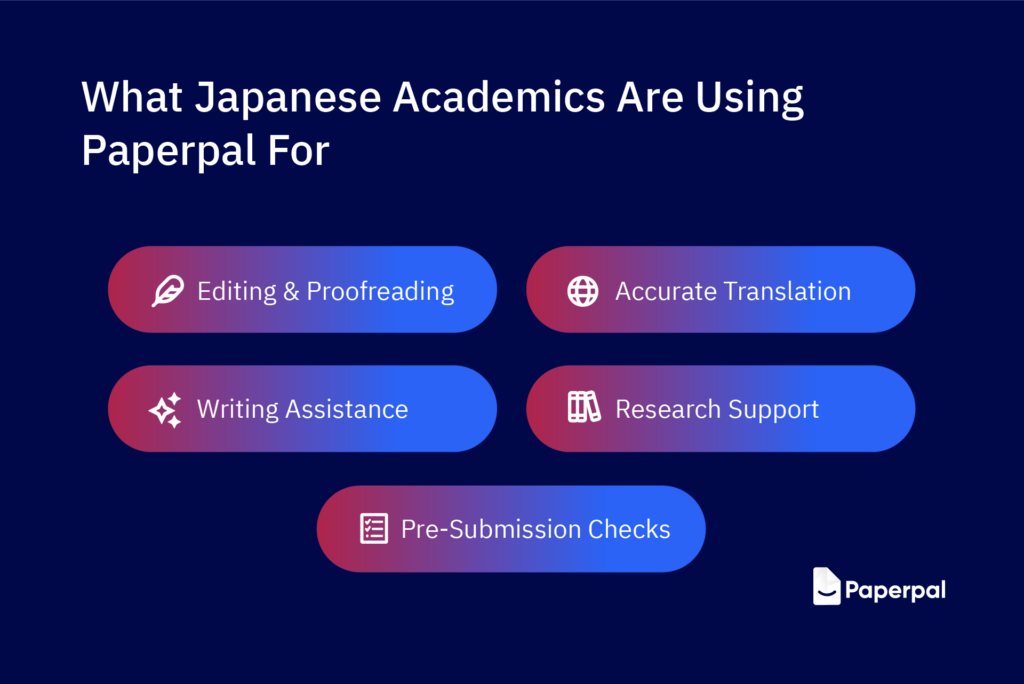
Delivering Impact: Paperpal Enhances Quality, Speed, and Productivity for Japanese Academics
Paperpal cuts writing time by 60%, improving productivity
A study among students at Iwasaki Lab, University of Tokyo, revealed that using Paperpal helped to reduce the academic writing time by as much as 60%.7 This improved productivity paves the path to academic excellence and fast-tracks publishing success for the university’s students and researchers.
Additionally, we found that in May 2024 alone, Paperpal helped Japanese academics claim back 6,358 hours, which they could then use to focus on their research. It saved 5,945 hours that would otherwise be spent on correcting grammar and 413 hours to ensure accurate Japanese to English translations. These estimations are based on real-time processed volumes by Paperpal and the assumption of typical turnaround times for professional human proofreading (2,500 words per hour) and expert translation (1,000 words per hour).
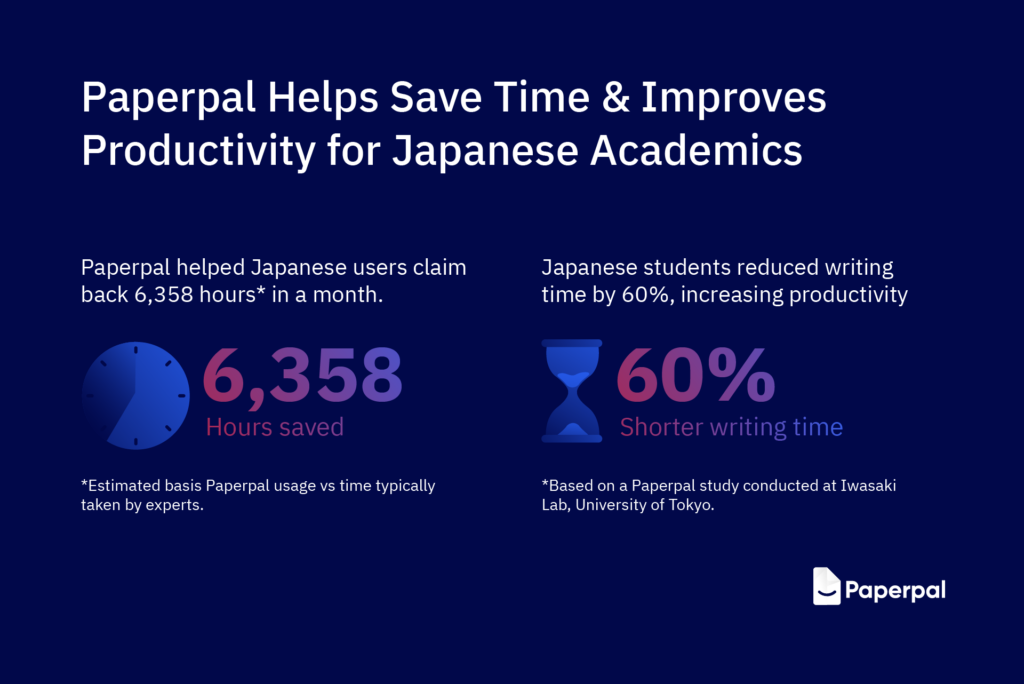
More Japanese academics are using Paperpal
With a user-friendly interface and localized payment structures, more students and researchers in Japan are choosing Paperpal as their preferred academic writing assistant. Paperpal now serves more than 20,000 Japanese academics, which is an impressive 5x increase in the number of users from Japan over the past one year.
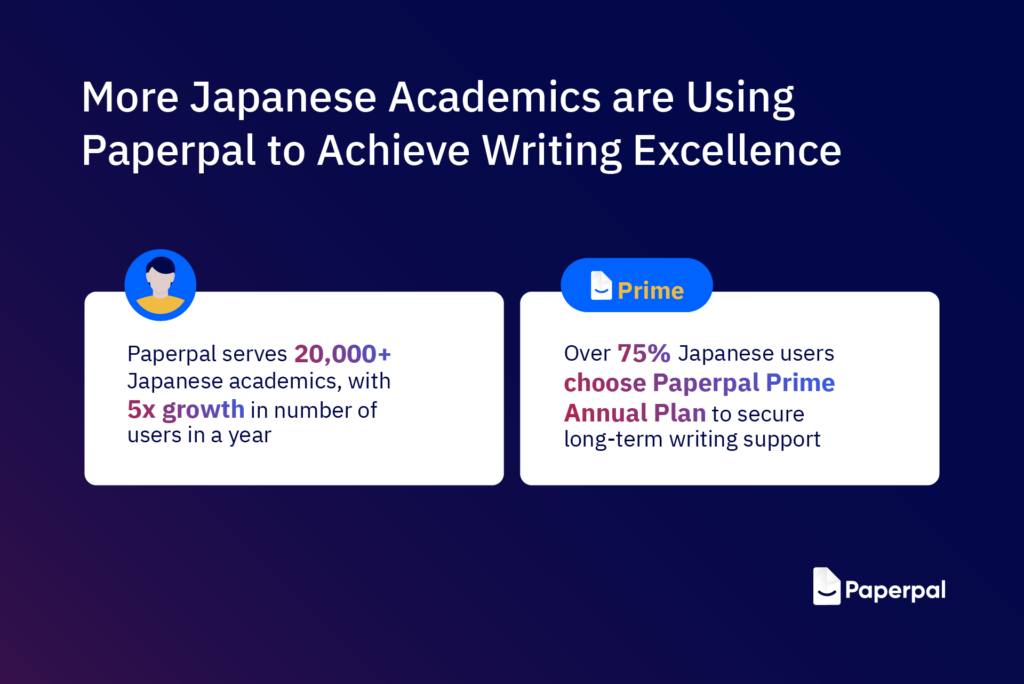
Japanese academics are using Paperpal Prime to level up
This growing interest from students and researchers in Japan have made it one of the top countries for Paperpal Prime subscriptions. Moreover, over 75% of our users in Japan who choose Prime subscription, choose the annual plan, which signifies their long-term commitment to academic writing excellence. With full access to generative AI features, citation generator, consistency checks, plagiarism detection, and submission readiness assessments, Japanese academics are taking the tedious research, writing, editing, and submission journey to the next level.
Academics from top Japanese universities choose Paperpal
Students and researchers from leading universities and institutions across Japan are turning to Paperpal as their preferred AI writing assistant. These include academics from the University of Tokyo, Kyoto University, Osaka University, Hokkaido University, and Kyushu University among others.
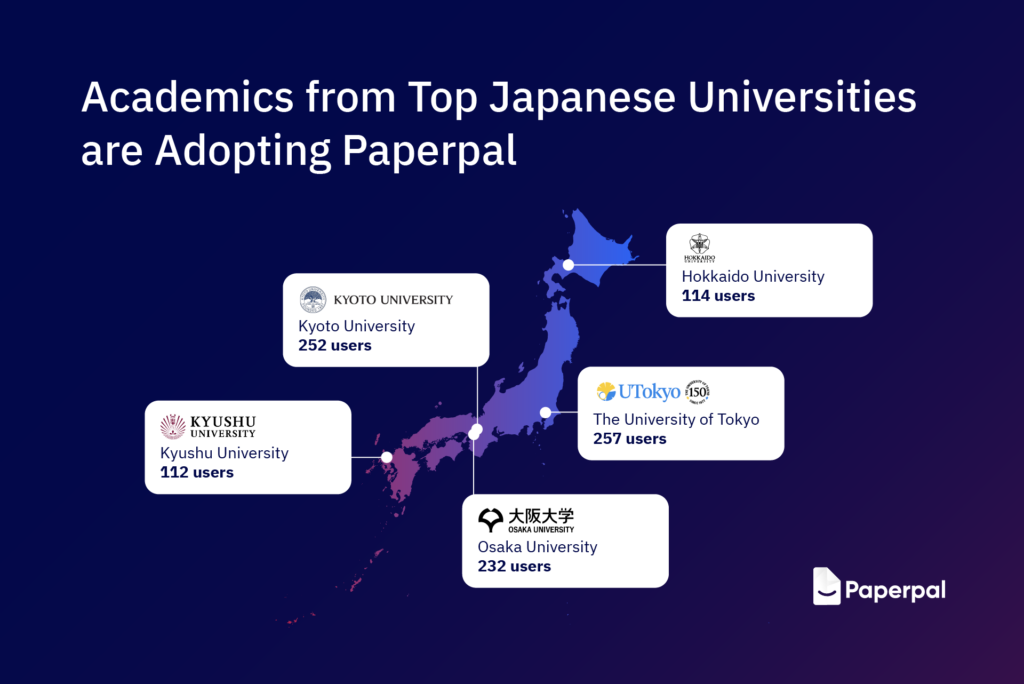
Paperpal is Winning the Trust of Japanese Academics
With more Japanese students, researchers, and professionals using Paperpal, we’re seeing more love and feedback on how the tool is transforming their research journey. A Net Promotor Score of 48.3 from Japan academics in May 2024 reflects the growing satisfaction levels and higher likeliness of them recommending Paperpal to peers. To put this in perspective, we checked other AI tools like Grammarly, which only received an NPS of 28 in the same month, highlighting how Paperpal is more valuable for Japanese academics.
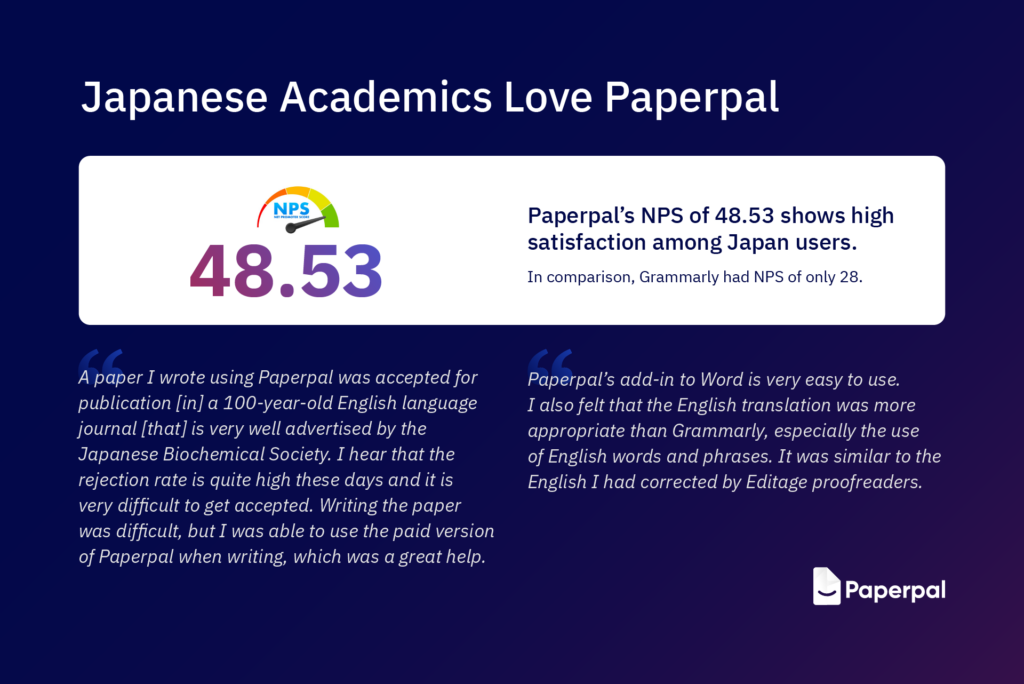
Paperpal prides itself for continually building and introducing advanced AI features to improve the academic writing journey. We’re thrilled to see how our efforts are transforming academics’ lives everywhere. Japanese academics love our translation, proofreading, and paraphrasing features and appreciate Paperpal’s accuracy, effectiveness, and ease of use. Read what our users from Japan have to say about Paperpal’s impact on their academic publishing journey:
“Paperpal’s add-in to Word is very easy to use. I also felt that the English translation was more appropriate than Grammarly, especially the use of English words and phrases. It was similar to the English I had corrected by Editage proofreaders.” – Mr. Hiroto Takenaka, Professor Rehabilitation Therapy, Certified Subject Matter Expert
“I tried several times to use Grammarly to proofread my work in English, but when I compared the proofreading with the one made by Paperpal, I found that Paperpal was better suited for my work in terms of grammar.” Keiko Goto, Associate Professor, Juntendo University School of Medicine
“I am often the project leader and I write the methodology and results. Paperpal’s rewrite function makes it easier for me to write, and the time it takes to write is reduced, making it easier for me to work on the next project. I think Paperpal has made a great contribution to my work.” – Changju Kim, Professor, College of Business Administration Department of Business Administration, Ritsumeikan University
“A paper I wrote using Paperpal was accepted for publication [in] a 100-year-old English language journal [that] is very well advertised by the Japanese Biochemical Society. I hear that the rejection rate is quite high these days and it is very difficult to get accepted. Writing the paper was difficult, but I was able to use the paid version of Paperpal when writing, which was a great help to me.” – Kenji Akasaki, Professor, Faculty of Pharmaceutical Sciences, Fukuyama University
Paperpal is transforming the challenging academic writing process for Japanese academics, helping them use AI ethically to write better, faster. By eliminating the need to use multiple AI tools on the writing journey and automating critical checks at every step, it saves hours of time for Japanese academics, empowering them to produce high-quality content in half the time. With more time on hand, Japanese academics can focus on their research and move closer to achieving their publication goals. This in turn benefits Japan’s top universities and research-based organizations, who are able to foster an environment of growth and excellence and make significant contributions to science.
Experience the advantage that Paperpal can bring to your academic writing. Start writing with Paperpal for free now or write to hello@paperpal.com for more details, and we’ll be happy to help!
References
- Okamura, A. How do Japanese researchers cope with language difficulties and succeed in scientific discourse in English?: interviews with Japanese research article writers. The Economic Journal of Takasaki City University of Economics, Vol.48, No.3, 2006. Available online at http://www1.tcue.ac.jp/home1/k-gakkai/ronsyuu/ronsyuukeisai/48_3/okamura.pdf
- Burbridge, D. Cultural differences: English writing for Japanese researchers. Editage Insights, 2024. Available online at https://www.editage.com/insights/cultural-differences-english-writing-for-japanese-researchers/
- Hook, D.W., Wastl, J., Simon, J.P. Japanese Collaboration in the Global Research Landscape. Digital Science Report, 2018. https://doi.org/10.6084/m9.figshare.7296854.v2
- Education First 2023 English Proficiency Index. Available online at https://www.ef.com/wwen/epi/regions/asia/japan/
- Amano, T. et al. The manifold costs of being a non-native English speaker in science. PLOS Biology, 2023. Available online at https://journals.plos.org/plosbiology/article?id=10.1371/journal.pbio.3002184
- Masutani, Y. The Foreign Language Anxiety of Japanese EFL Learners: Focusing on Anxiety When Speaking English. Graduate School of Literary Studies of Doshisha Women’s College of Liberal Arts, 2021. Available online at https://www.jstage.jst.go.jp/article/letkansai/19/0/19_1/_pdf/-char/en
- Cactus Communications conducts monitor survey of AI English proofreading and translation tool “Paperpal” at Iwasaki Laboratory, University of Tokyo, Editage, 2024. Available online at https://www.editage.jp/blog/paperpal-monitoring-survey/


